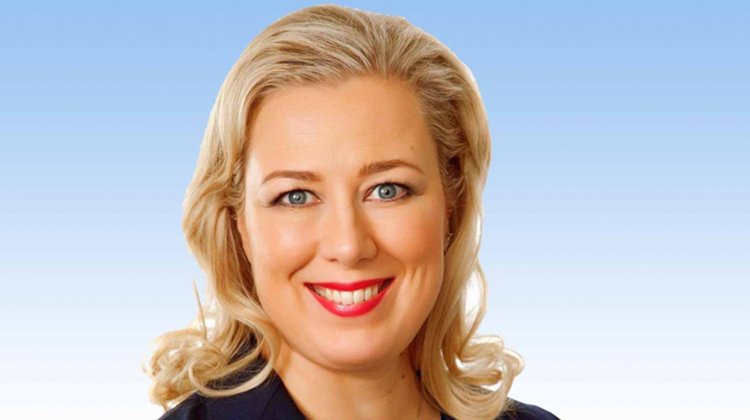Commissioner Urpilainen: “Global Gateway and working together as Team Europe can open doors for smaller Member States"
07:31 - 11 July 2024

Commissioner for International Partnerships Jutta Urpilainen has explained the philosophy of Global Gateway, the EU’s strategy for international development.
She was responding to written questions by the Cyprus News Agency ahead of her visit to Cyprus on 11 July.
Urpilainen also talked about the role that Cyprus can play in the EU’s efforts, including through its shipping sector, the cooperation between port authorities in relation to critical raw materials, and the promotion of green hydrogen.
The Commission has announced that Commissioner Urpilainen will meet Foreign Minister Constantinos Kombos as well as representatives of the private sector.
Responding to a question on the prospects, opportunities and challenges for the development of Cypriot shipping industry and the role the EU can play, Urpilainen said that “sustainable infrastructure and connectivity have the potential to offset development and help the EU and partner countries prosper together through trade and cooperation”.
The Commissioner pointed out that resilience and diversity of supply chains are key concerns for both the EU and partner countries. “Naturally, port infrastructure and shipping industry are at the heart of this, and my wish is that we can have several European actors from this sector involved in the implementation of the EU’s Global Gateway strategy, for example through the Global Gateway Green Shipping Corridor” she added.
“We already have some good examples of cooperation between port authorities in relation to critical raw materials and green hydrogen value chains. I am sure this topic will be discussed when I visit Nicosia and meet Cypriot private sector representatives” she pointed out.
Global Gateway, Urpilainen explained, is the EU’s global investment strategy and contribution to the UN Sustainable Development Agenda.
“Its objective is to mobilise 300 billion euro worth public and private investments in sustainable infrastructure, enabling environment and human development in partner countries – in the Global South – by 2027” she noted.
Global Gateway, she continued, “embodies the new paradigm of EU development cooperation” by “building mutually beneficial, equal partnerships through a 360-degree approach”. “We want to prosper together and leave no one behind” she stressed.
Urpilainen explained that Global Gateway is delivered through the actions of “Team Europe”, through which “the European Commission, EU Member States and European development finance institutions work closely together and pool resources and expertise”.
“We use public resources to leverage private investments through innovative financing tools, such as guarantees. Global Gateway projects provide opportunities for European companies to enter emerging markets, where high demand exists especially for sustainable and fair green and digital solutions” she underlined.
Responding to a question on the role Cyprus could play as a small country with limited abilities but with an important geographical location, the Commissioner said that “Global Gateway and working together as Team Europe can open doors for smaller Member States, who do not necessarily have wide embassy networks, to participate in projects as part of consortia”.
Moreover, she added, Team Europe “allows Member States to contribute in various ways, and not all contributions have to be financial. Member States have different kinds of expertise. As you mention, Cyprus for instance has very prominent shipping sector and ample maritime knowhow”.
Commenting on whether the situation in the Middle East affects the EU’s international partnerships, Urpilainen said that the crisis “is of serious concern to the EU for several reasons, including the alarming humanitarian situation and stability of the wider region”, and added that from the start of the crisis “the EU has demanded international humanitarian law to be respected by all parties and warned against escalation”.
“I would not say that the crisis has disrupted the EU’s international partnerships, but it adds on the geopolitical tensions, which represent a major challenge for the multilateral system. I consider active engagement and cooperation with the Global South an important tool in mitigating these tensions and strengthening common commitment to the rules-based international order” she added.
Finally, referring to the EU’s initiative to support the countries in Africa in producing their own vaccines and responding to a question how those efforts are developing, the Commissioner said that she is “proud to say that good progress has been made”.
“Ramping up production of safe, effective, and affordable health products, including vaccines, in Africa for Africa is one of the flagships of Global Gateway” she continued.
“The concept of Global Gateway was actually born from this initiative, as the pandemic revealed the extent of health inequalities and the urgency to boost health resilience of our partner countries” she explained.
“To date, we have mobilised around 2 billion euro to support work on three strands: regulatory frameworks, production of vaccines and medicines, and securing sufficient demand. Critical vaccines are already being produced in South Africa, and manufacturing facilities are taking shape in Rwanda and Senegal” she added.
(Source: CNA)

